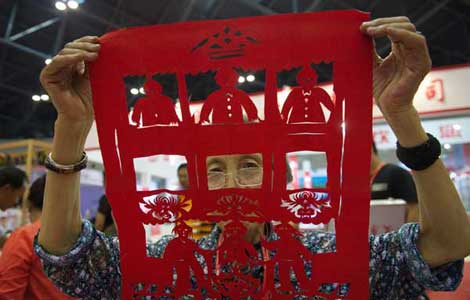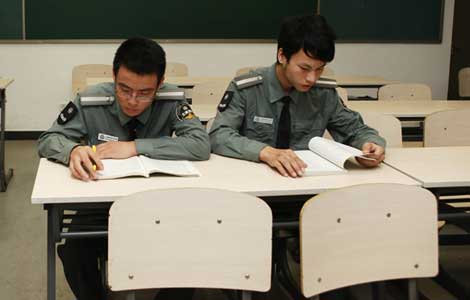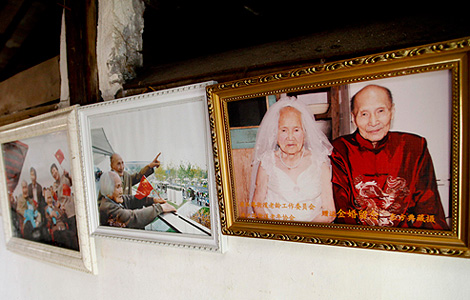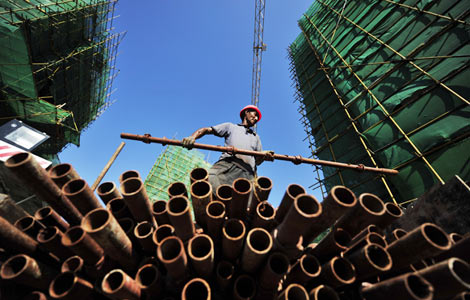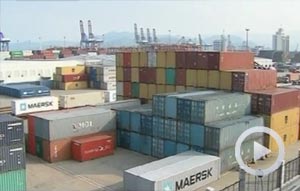Premier Li lauds Guangxi's potential
Updated: 2013-07-09 01:54
By LI YANG and HUO YAN (China Daily)
|
||||||||
Premier Li Keqiang called for tapping the potential of the nation's southwest hinterland as he visited Qinzhou port in the Guangxi Zhuang autonomous region on Monday.
"Guangxi is the only provincial region with large ports in west China and it has the ability and conditions to become a strategic regional pivot for the whole Southwest China to develop a foreign-bound economy toward ASEAN," he told workers as he visited the port area in heavy rain.
Qinzhou is the largest port in Guangxi's Beibu Gulf Economic Zone. In 2012, Qinzhou port's handling capacity reached 100 million tons, with actual throughput of 56.2 million tons, a growth of 19 percent from a year earlier.
"Your hard work on the port means a robust export for China. The prosperity of the ports will add national revenue and promote the country's development," he noted.
Li also held an informal discussion with local small business owners and encouraged them to give suggestions about their business environment.
"The big enterprises are pillars of the national economy and your enterprises should prosper everywhere in the economy," he told the businessmen. "You make important contributions to economic growth and job markets. The government should improve the business and market environment to support your enterprises' development."
The Chinese government recently vowed to open up the financial market for private capital and to inject vitality into the cash-thirsty real economy. Li's visit can be interpreted as a practical action of the central authority's support for the private sector economy.
Guangxi attracted 566 billion yuan ($92.3 billion) worth of investment last year, five and a half times the figure in 2007, while utilized foreign investment grew from $1.29 billion to $3.18 billion over the period.
The rapid growth is partly due to its close cooperation with Southeast Asian nations. ASEAN has been Guangxi's largest trade partner for 13 years. Guangxi leads the 12 provinces in western China in trade with ASEAN and has hosted all nine sessions of the China-ASEAN Expo since 2004, with its capital city Nanning the permanent host of the annual event.
Peng Fangqing, 43, chief representative of Hong Kong-based China Resources Group, echoed Premier Li: "Our company has invested about $8 billion yuan in Guangxi since 2001 in cement, real estate, retail, the food industry and banking. Thirteen years ago, we saw Guangxi's potential as a regional hub. The past 13 years of robust development of Guangxi and our business prove we made the right decision then.
"I think Guangxi will develop into a regional economic and trade center for not only Southwest China but also the whole of Southeast Asia," Peng said.
Li Yanqiang, vice-director of the Beibu Gulf Economic Zone's planning and construction committee, said: "The premier's visit makes me feel firmly confident about Beibu Gulf's future. The strong economy of the region creates vast business opportunities for enterprises in various industries, including modern services and technological innovation. The next 10 years will be a golden period for domestic and overseas investors."
Jiang Xiuqian, vice-mayor of Fangchenggang city, said: "Being complementary in terms of production factors and market resources bodes well for bilateral cooperation between Fangchenggang and its ASEAN neighbors."
He hopes the central authority can lift controls on the import of cheap labor from ASEAN countries for the border areas like his city. "It is a pity some Hong Kong businessmen left Fangchenggang for Vietnam to take advantage of the cheap labor resources there, he added.
"The people-to-people contacts between Beihai city and South East Asian nations have a long history. The establishment of the China-ASEAN Free Trade Area and strategic partnership has solid human and cultural foundations. It is absolutely right for the central government to make good use of the cultural and historical legacy between Guangxi and neighboring countries," said Hong Xiaolong, director of the economic research center with Beihai city government.
Ding Qiwen, secretary-general of the office of Qinzhou port, pointed out the press problem for the port: "The backward infrastructure construction for traffic is a big bottleneck for Qinzhou port's connection with the hinterland of Southwest China. Besides, Qinzhou's underdeveloped industrial base weakens its potential as a regional port."
- Senior Guangxi official under probe for suspected discipline violations
- Tourism to become key for Guangxi
- Guangxi invests heavily on housing and rural-urban development
- Guangxi to build wireless cities with 4G network
- China's Guangxi products showcased in Vietnam
- China's Guangxi to hold trade fair in Vietnam
Most Viewed
Editor's Picks

|

|

|

|

|

|
Today's Top News
Boeing 777 passenger 'mumbled a prayer'
Ex-minister gets suspended death
Workers return after dispute
Job seekers should be cautious abroad
River pollution sparks criticism
Terror attack was planned: suspect
Booming security industry needs skilled youth
A bright future for native black pigs?
US Weekly

|

|


